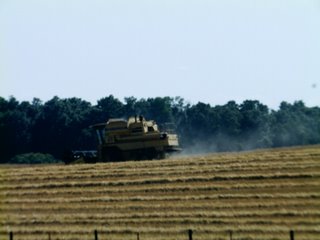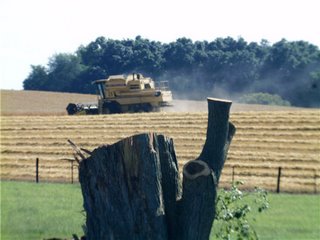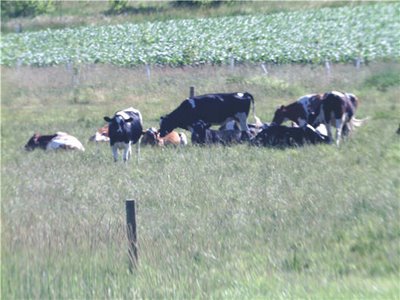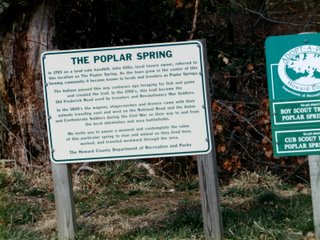Like all great civilizations, ours is based on agriculture and we need to make national policy with that fact front and center.
The purpose of Poetslife is to promote the art and discipline of American Tactical Civil Defense for families and small businesses and to contribute practical American civil defense preparedness guidance for all Americans through my articles in the The American Civil Defense Association (TACDA.ORG) Journal of Civil Defense and leadership as the volunteer Vice President of TACDA.
1/06/2007
Carroll County MD Rural Life
I took these in a half hour drive only two miles from my Mt. Airy, MD home. What good, hard working, and spirit-filled people have created this over the centuries. This is worth preserving and fighting for...for us, for our children, and for our children's children.
Like all great civilizations, ours is based on agriculture and we need to make national policy with that fact front and center.
Like all great civilizations, ours is based on agriculture and we need to make national policy with that fact front and center.
Labels:
Carroll County MD Rural Life
12/02/2006
Volunteer Mobilization Center
 Know where your local Volunteer Mobilization Center is BEFORE disaster strikes!!!
Know where your local Volunteer Mobilization Center is BEFORE disaster strikes!!!Volunteers for America:Here are some tips for how to set up one piece of the an emergency management and continuity of operations plans, the Volunteer Mobilization Center (VMC).
Volunteer Mobilization Center Sample Floor Plan Click the Sample Volunteer Mobilization Center Floor Plan icon on the left to print a larger copy. Neighbors helping neighbors, strangers helping each other who then become friends...i.e. Volunteers... are essential to the American Way of Life. The Volunteer Mobilization Center is where it all comes together and those friendships are cemented.
The VMC sample floor plan here shows the arrangement of the supplies, furniture, and flow for the various volunteers and their duties. No matter what the emergency, this is a good place to greet, identify, organize, train and dispatch all the volunteers who arrive to assist.
Tip: Identify and prepare the VMC BEFORE a disaster. For example, establish the local library, a church basement, fire house basement, or other room as THE central location for volunteers to go to and be organized to deal with the event.
Stock the VMC with tables, chairs, white boards, pens, wrist band identity bracelets, thin film solar batteries for back power for laptop computers, water, food, and all other supplies necessary to get it going and to maintain it.
VMC Support Staff - Core Staff Roles: * VMC Manager * Logistics Coordinator * Security Coordinator * Data Entry Staff * Agency Liason * Runners * Media Coordinator * Greeters
There would be no America without volunteers Barn raisings that were critical to early farm life were done by volunteers. From the early settlers, to George Washington's Continental Army, to every religious, military, fraternal, association, we have depended on volunteers. There are cemeteries all over America with with white marble crosses and stars of David with hundreds of thousands of America's best volunteers.
Recently, just look at any area of America recently hit by earthquake, flood, ice storm, extreme wind, jihad's, hurricane, fire, chemical spill, or any of the other man-made or natural disasters that strike as regularly as the change of seasons.
Volunteers mitigate, plan for, respond to, fix, clean, repair, medically assist, and undertake the hundreds of thousands of individual tasks that mean survival, recovery, and a brighter day.
Basically, a core of professionals (fire fighters, police, emergency operations center managers and staff, doctors, nurses, and so forth) are supported by a deep bench of spontaneous volunteers who contribute mightily in any successful disaster mitigation, planning, response, and recovery.
It was true when the British occupied Philadelphia and American volunteers had to survive at Valley Forge, to World War Two when American's saved their spare iron coat hangers and oven grease for the war effort, to the thousands who showed up to help with the work to be done at the World Trade Center after the 9/11 attack to the current work of repairing the Gulf after Katrina.
To all the American volunteers who have given and now give their time, talent, treasure...and often their limbs and lives... for their family, friends and strangers...my and my family's deepest gratitude.
Additional Resources
Citizens Corps
Fire Corps
FEMA Training
Labels:
Volunteer Mobilization Center
11/04/2006
Carroll County MD Links
Near-death experiences, in my experience (and I've had a number of them), lead to a high level of awareness soon afterwards. You look at things differently. A 20-year old in his grandfather's Jaguar cut in front of me and almost killed me recently. Here are some Web links and photos of rural Carroll County, MD where I live. These scenes are there every day. I just went out and captured them today because I'm still alive. And here area a few recent poems. Being alive is good.
ccgovernment.carr.org/ccg/default.asp
mdarchives.state.md.us/msa/mdmanual/36loc/carr/html/carr.html
carrollcountytourism.org/
westgov.com/
Town of Mt. Airy Website
carrollcountytourism.org/
westgov.com/
Town of Mt. Airy Website
Oak

There is a massive oak tree
I pass on my may to work.
A proud oak
Brought down by forces of nature.
In my genes,
Is a code that can split me in two.
Unlike that great oak,
I can get up, replant myself
And grow again
With spirit, grit and grace.

Saving a Life
It’s true.
I dragged you from the fire
Half burned and unable to find the exit.
I guess you could say
I saved your life that day.
But it will never compare to the way that
Through food, warmth, hard work, laughter
 And a woman’s love and life force
And a woman’s love and life force
You have saved my life every day
Before and since that day.
Life School Dance
When I was young and naive
I splashed on too much cologne
And dressed to the nines
And headed to the school dance
To laugh with my friends
 And to steal glances of lasses
And to steal glances of lasses
With shy and bold smiles
Who flipped their long hair
And exposed their necks
And laughed some more until,
Tired of the teasing,
I asked them to dance
And the music took control
And everything was new
And mysterious and wondrous
 Until, after more giggling and shy banter
Until, after more giggling and shy banter
If the girl was sweet or the timing was right
I would end up practicing at kissing
But mostly laughing because neither
Of us knew that this charged ritual
Eventually led to courting, marriage,
Children, mortgages, and bills,
Or the quarried heartache
Of a child lost in war.
Such a timeline is never revealed
In the first laugh or kiss.
Thank God.

There is a massive oak tree
I pass on my may to work.
A proud oak
Brought down by forces of nature.
In my genes,
Is a code that can split me in two.
Unlike that great oak,
I can get up, replant myself
And grow again
With spirit, grit and grace.

Saving a Life
It’s true.
I dragged you from the fire
Half burned and unable to find the exit.
I guess you could say
I saved your life that day.
But it will never compare to the way that
Through food, warmth, hard work, laughter
 And a woman’s love and life force
And a woman’s love and life forceYou have saved my life every day
Before and since that day.
Groove
I’m in a groove
 Waiting for my oldest son Josh to show
Waiting for my oldest son Josh to show
To see Little Miss Sunshine
A movie with Steve Carell
A funny actor we both enjoy
When I think of my mom,
Dead three years now,
And how her face lit up
When any of her 8 children
Or 19 grandchildren would visit
And I know that, feel it,
The groove, that moment of happiness
 Raised to a power of ten
Raised to a power of ten
Because here is my family,
Strong, shared, tender, good,
And even if people on the news
Are lobbing rockets and missiles
And bombing each others families,
My family here is safe,
And safe is oceans from sorrow.
I’m in a groove
 Waiting for my oldest son Josh to show
Waiting for my oldest son Josh to showTo see Little Miss Sunshine
A movie with Steve Carell
A funny actor we both enjoy
When I think of my mom,
Dead three years now,
And how her face lit up
When any of her 8 children
Or 19 grandchildren would visit
And I know that, feel it,
The groove, that moment of happiness
 Raised to a power of ten
Raised to a power of tenBecause here is my family,
Strong, shared, tender, good,
And even if people on the news
Are lobbing rockets and missiles
And bombing each others families,
My family here is safe,
And safe is oceans from sorrow.
Life School Dance
When I was young and naive
I splashed on too much cologne
And dressed to the nines
And headed to the school dance
To laugh with my friends
 And to steal glances of lasses
And to steal glances of lassesWith shy and bold smiles
Who flipped their long hair
And exposed their necks
And laughed some more until,
Tired of the teasing,
I asked them to dance
And the music took control
And everything was new
And mysterious and wondrous
 Until, after more giggling and shy banter
Until, after more giggling and shy banterIf the girl was sweet or the timing was right
I would end up practicing at kissing
But mostly laughing because neither
Of us knew that this charged ritual
Eventually led to courting, marriage,
Children, mortgages, and bills,
Or the quarried heartache
Of a child lost in war.
Such a timeline is never revealed
In the first laugh or kiss.
Thank God.
Jesus Sign

“Honk if you know Jesus!”
I read the sign and respond
Honking my horn
And the fellow who holds it
Raises his hands and thanks me.
That takes courage.
Not for me
For him
 Standing by the side
Standing by the side
Of a busy highway.
Some may gesture with a digit
Some may throw things at him
Some may almost run him over.
But some honk
And that’s enough for him.
Clap your hands if you know Jesus!
If you are at a reading.
Clap your hands if you love Jesus!
If you are reading this.

“Honk if you know Jesus!”
I read the sign and respond
Honking my horn
And the fellow who holds it
Raises his hands and thanks me.
That takes courage.
Not for me
For him
 Standing by the side
Standing by the sideOf a busy highway.
Some may gesture with a digit
Some may throw things at him
Some may almost run him over.
But some honk
And that’s enough for him.
Clap your hands if you know Jesus!
If you are at a reading.
Clap your hands if you love Jesus!
If you are reading this.
Labels:
Carroll County MD Links
8/12/2006
Web 2.0
 Web 2.0 is happening...now. Here are some good insights as to why:
Web 2.0 is happening...now. Here are some good insights as to why:Debbie Weil
Gaping Void
PodTech
Yannick Lejeune
Labels:
Web 2.0
Knowledge at Wharton
 If you ever wondered just who "The Man" is...the closest I ever got to The Man was going to school alongside Whartonites while attending The University of Pennsylvania. They think about money and wealth alot, as here.
If you ever wondered just who "The Man" is...the closest I ever got to The Man was going to school alongside Whartonites while attending The University of Pennsylvania. They think about money and wealth alot, as here.They are unique. They help create this huge American economic miracle. Here is their intellectual jauggernaut: Knowledge at Wharton. If you are involved in any aspect of business, enjoy the articles, news, podcasts, analysis and data. They do a great job. Here is Wharton Publishing.

The Body Parts Market is a representative piece. This is particularly interesting to me because I was in Philadelphia for my niece's wedding recently and talked to my cousin who is a homicide detective there. He told me he just spent two years investigating a body parts ring that operated out of a back alley in North Philadelphia.
Bodies that were left to be creamataed were instead sent to this back alley where they were cut open for their very valuable body parts which were then stored in ice chests and sold to local doctors and hospitals. Who knew?
Labels:
Knowledge at Wharton
6/02/2006
Robert Scoble Podtech Rocketboom
 Robert Scoble is an extraordinary man who is flipping the business world on its head.
Robert Scoble is an extraordinary man who is flipping the business world on its head.(That guy with the wild head of curly hair is my 20-year old, Josh, doing his flips on the backyard trampoline. He's a mechanical engineer entering his last year at the University of Maryland. He's bright, humble, athletic, and gifted in math and science. He just taught himself mandolin and guitar, recently recording a CD at a studio outside Pittsburgh. He's going to make a great employee and an even greater husband for some fortunate girl.)
Robert Scoble wrote Naked Conversations.
He has what the Irish call "The Magics," an extraordinary ability in some endeavor. In Robert's case, it is introducing others to the wonders of technology and blogging and the fact that trust between people is what takes technology from a dead bit to a better life.
I stumbled upon Robert's magic when I read his book Naked Conversations that he co-authored with Shel Israel.
Having studied and written poetry, fiction, and technical writing for many years, I can usually tell a good deal about someone from their writing.
 What struck me most about this tome was the genuine spirit in which it was written, the ease with technology and the good that it could bring to humanity if done correctly, the evident humility and lack of pretentiousness in the writing, the insights that talking...not technology...drive the blogosphere, and the impressive marshaling of facts to support the premise that we are in for a revolutionary change due to blogs as great as when Jonathan Edwards preached the Great Awakening up and down the 13 colonies in the 1740's.
What struck me most about this tome was the genuine spirit in which it was written, the ease with technology and the good that it could bring to humanity if done correctly, the evident humility and lack of pretentiousness in the writing, the insights that talking...not technology...drive the blogosphere, and the impressive marshaling of facts to support the premise that we are in for a revolutionary change due to blogs as great as when Jonathan Edwards preached the Great Awakening up and down the 13 colonies in the 1740's.Now...some was Shel and some was Robert...but even the fact that they co-authored this work and collaborated proved their point...blogs are the modern incarnation of Hegel's famous thesis -antithesis, synthesis idea.
You talk...I react...you react to my reaction...we talk some more, hash it over and reach consensus...then we act.
This has driven mankind from the hunters to the warriors to the businessman to the product team in any corporation.

I visited Scobalizer where Robert really has the magic's is his ability to wear his heart on his sleeve. Recently, he lost his mother.
He blogged about it in a very honest way. He said how boring it was to watch his mother die. I lost my mother two years ago and I have to agree.
As Christ said, "Let the dead bury the dead."
For what it's worth, Robert, if you ever read it, here are a few poems I wrote after my mother passed away that I hope helps you deal with the grief.
Poetry lets the mind and soul scream in the silence...and laugh as well.
He is one I wrote for my dear departed mother.
Dreaming of Maytag
"Regan Maud Good was a Maytag Fellow
at the Writers' Workshop in Iowa."
Contributors BioThe Antioch Review

P. 126, Vol. 53 No.1 1995
"MAYTAG!!!"
my mother's dream
for whom Sears Kenmore
was all she and my father
could afford to clean
1950's and 60's whites,diapers,
and clothes of eight children's sweat,
blood, dirt and life.
"MAYTAG!!!"
she would repeat
like a Buddhist chant to no one
in particular as she loaded
another two dozen diapers
into the Sears Kenmore.
Maytag to me ever since
has represented everything good
and right about America:
an extremely durable, practical,
and useful product that serves
the family needs for decades
and all at a fair price.
"MAYTAG!!!"
I can still hear my mother say
looking at the Appalachian mountain
of soiled laundry
on the concrete floor before her:
six mountains of socks,
five mountains of underwear,

four mountains of shirts,
three mountains of pants,
two mountains of diapers,
one mountains of separates.
"MAYTAG!!!"
my mother would repeat
with each and every load.
Here, thirty-five years later
in the contributors notes
when trying to discern
the kinds of poetry and poets
the Antioch Review accepts,
I find Maytag offers a "Maytag Fellow."
Free money and two free years of writing time.
I look over at my Appalachian mountains:
six mountains of credit card statements,
five mountains of IRS bills,
four mountains of mortgage,
three mountains of car bills,
two mountains of utility bills,
one mountain of children's bills.
"MAYTAG!!!"
I chant like my mother now.
"MAYTAG!!! MAYTAG!!! MAYTAG!!!"
That Laugh
That laugh would start
like an ocean wave
"AAAAAA…AAAAA
…AAAAAA…AAAAA "
and build in volume, depth, and pitch

until it became a tidal wave
"AAAA…AAAAAA
…AAAAA…AAAAA
and washed over
my brothers and sisters and I,
to our delight as children and adults,
to our embarrassment when teenagers
out in public, over everyone
within a half mile round
and continue in undulating wave
after wave until you wondered
how she got oxygen fast enough
to supply those great waves
of laughter that seemed to plumb
the very depths of a joyful heart.
It wasn't all laughter, of course.
There were Harry's diseases…
but even during the worst days
the laughter continued
in great bursts and passion.
And among her many sayings:
"God doesn't close one door
that he doesn't open another!"
"The lint on your clothes
means your going to come into money!"
she expressed the desire:
"I pray to God every night for each
one of you and that I go first.
It must be the hardest thing on earth

to lose one of your children first."
Now your prayer has been answered.
If we are allowed to carry
one talent from earth into heaven
when my time comes, and if
God decides to take me in,
I expect I will hear that laugh rising,
as it did on earth, louder and higher
than all the others to say, as she had
so many times when she was alive
and knew that it was only half true,
"You did it all on your own, kid,
and I'm very, very proud of you!"
Labels:
Robert Scobel Podtech Rocketboom
3/28/2006
Directory of Small Business Blogs
Read a brief and tightly-written review of two books, Blogwild! by Andy Wibbels and Naked Conversations by Shel Israel and ubberblogger Robert Scoble, by Richard Pachter of the Miami Herald, here. His headline reads, Can your business benefit from blogging? and his review and these two blog books will help you decide.
by Shel Israel and ubberblogger Robert Scoble, by Richard Pachter of the Miami Herald, here. His headline reads, Can your business benefit from blogging? and his review and these two blog books will help you decide.
A directory of small businesses that have blogs can be found at the Small Business Blog Directory. Moveable type is worth looking into as well.
Another small business blog resource is pajama marketing. The link to the small Aldo Coffee Company in Mt. Lebanon, PA is worth reading and analyzing as it shows a small business blog that is well designed, easy to use, effective, current...and drives increased sales.
For productivity tips useful to small businesses, such as how to deal with email quickly, efficiently, and productively, you should visit 43 Folders.
For cheap advertising, find and use other business blogs that are in your market or a closely related market. Find out how at Blog News Channel by Nathan Weinberg, who says: I would suggest most bloggers give this a shot. The cost is minor, the exposure can be huge. Talk a bout using the long tail of advertising! I think that if we see more of these ads on blogs, and less ads for “valuable xml feeds”, AdSense will be more useful and entertaining for everyone.
bout using the long tail of advertising! I think that if we see more of these ads on blogs, and less ads for “valuable xml feeds”, AdSense will be more useful and entertaining for everyone.
This is the ad he has piggybacked onto Google ads: An Excellent Blog Nathan Weinberg knows what he’s talking about. Read his stupid blog [His words...not mine...in his ad] google.blognc.com
For more information, here is the Table of Contents of the Small Business Blog Directory:
Table of contents
1 Weblogs about Small Business Topics
1.1 Accounting-Finance, Small Business
1.2 Advertising, Small Business
1.3 Company Blogs (Blogs about a specific small business)
1.4 Content Management
1.5 Entrepreneurship & Business Ownership
1.6 Human Resources, Small Business
1.7 Intellectual Property Issues, Small Business
1.8 Legal Issues (blawgs), Small Business
1.9 Management, Small Business
1.10 Marketing, Small Business
1.11 Minority - Business Ownership
1.12 Motivation
1.13 News & Trends, Small Business
1.14 Online Marketing (including Search), Small Business
1.15 Organization (Getting Organized)
1.16 Public Policy & Regulations, Small Business
1.17 Public Relations, Small Business
1.18 Research, Small Business
1.19 Rural and Small Town, Small Business
1.20 Sales, Small Business
1.21 Selling to Small Business (The Small Business Marketplace)
1.22 Technology, Small Business
1.23 Weblogs About Small Business Blogging
1.24 Women - Business Ownership
1.25 Work-Life Balance
3 See also
 by Shel Israel and ubberblogger Robert Scoble, by Richard Pachter of the Miami Herald, here. His headline reads, Can your business benefit from blogging? and his review and these two blog books will help you decide.
by Shel Israel and ubberblogger Robert Scoble, by Richard Pachter of the Miami Herald, here. His headline reads, Can your business benefit from blogging? and his review and these two blog books will help you decide.A directory of small businesses that have blogs can be found at the Small Business Blog Directory. Moveable type is worth looking into as well.
Another small business blog resource is pajama marketing. The link to the small Aldo Coffee Company in Mt. Lebanon, PA is worth reading and analyzing as it shows a small business blog that is well designed, easy to use, effective, current...and drives increased sales.
For productivity tips useful to small businesses, such as how to deal with email quickly, efficiently, and productively, you should visit 43 Folders.
For cheap advertising, find and use other business blogs that are in your market or a closely related market. Find out how at Blog News Channel by Nathan Weinberg, who says: I would suggest most bloggers give this a shot. The cost is minor, the exposure can be huge. Talk a
 bout using the long tail of advertising! I think that if we see more of these ads on blogs, and less ads for “valuable xml feeds”, AdSense will be more useful and entertaining for everyone.
bout using the long tail of advertising! I think that if we see more of these ads on blogs, and less ads for “valuable xml feeds”, AdSense will be more useful and entertaining for everyone.This is the ad he has piggybacked onto Google ads: An Excellent Blog Nathan Weinberg knows what he’s talking about. Read his stupid blog [His words...not mine...in his ad] google.blognc.com
For more information, here is the Table of Contents of the Small Business Blog Directory:
Table of contents
1 Weblogs about Small Business Topics

1.1 Accounting-Finance, Small Business
1.2 Advertising, Small Business
1.3 Company Blogs (Blogs about a specific small business)
1.4 Content Management
1.5 Entrepreneurship & Business Ownership
1.6 Human Resources, Small Business
1.7 Intellectual Property Issues, Small Business
1.8 Legal Issues (blawgs), Small Business
1.9 Management, Small Business
1.10 Marketing, Small Business
1.11 Minority - Business Ownership
1.12 Motivation
1.13 News & Trends, Small Business
1.14 Online Marketing (including Search), Small Business
1.15 Organization (Getting Organized)
1.16 Public Policy & Regulations, Small Business
1.17 Public Relations, Small Business

1.18 Research, Small Business
1.19 Rural and Small Town, Small Business
1.20 Sales, Small Business
1.21 Selling to Small Business (The Small Business Marketplace)
1.22 Technology, Small Business
1.23 Weblogs About Small Business Blogging
1.24 Women - Business Ownership
1.25 Work-Life Balance
3 See also
3/24/2006
Poor Documentation Costs Big Money
Every day, poor documentation costs businesses, customers, and taxpayers millions of dollars.
Usually, evidence of the costly results (financial, injuries, wasted productivity, missed deadlines, frustration, opportunity costs, etc. ) of poor documentation do not make into the media's search light.
Usually, evidence of the costly results (financial, injuries, wasted productivity, missed deadlines, frustration, opportunity costs, etc. ) of poor documentation do not make into the media's search light.
It's so routine.
And poor documentation is not sexy or sensational enough to attract the attention of a digital or paper journalist or celebrity.
This $6.7 million United States Air Force mistake was so costly it attracted a reporters attention (see below).
This $6.7 million United States Air Force mistake was so costly it attracted a reporters attention (see below).
It is worth reading for the lessons it offers, including the positive spin the USAF spokesman puts on this fiasco at the end of the piece.
He's not alone in this, unfortunately, which is one reason poor documentation continues despite the widespread costs.
Whoops! There goes $6.7 million
At Hill AFB: A 5'' safety pin shoots down an F-22 engine
A piece of metal - 5 inches long and of minimal cost - caused $6.7 million in damage to the engine of an F-22 fighter jet at Hill Air Force Base. Air Force officials say it was the most expensive mishap since the next-generation fighters began being deployed to operational squadrons last year.
Good Documentation Saves Money and Increases Profits
Reuters News Service once carried a story* about the International Space Station crew getting a difficult start because the written procedures the crew carried into orbit were not entirely reliable. This is NASA’s careful way of saying the setup procedures were so poorly written that the crew could not do their job.

Service engineers and maintenance technicians are able to keep the tool operating longer
Whoops! There goes $6.7 million
At Hill AFB: A 5'' safety pin shoots down an F-22 engine
| By Matthew D. LaPlante The Salt Lake Tribune |
The accident occurred Oct. 20, when the Air Force's first Raptor squadron, based in Langley , Va.
A 22-page investigative summary, released this week, concludes the engine was damaged when a mechanic failed to remove a safety pin from the plane's forward landing gear.

Just after the pilot, Maj. Evan Dertien, had started the Raptor's twin 35,000-pound-thrust engines, Senior Airman Arthur Blosser noticed the pin was still installed. Blosser signaled for Dertien to shut down the left engine so that he could approach and remove it.
As Blosser removed the pin, the streamer attached to it was caught in the jet intake of the Raptor's right engine, ripping the pin from his hand and sucking it into the engine.
Dertien, according to the report, "heard a crunch and a winding down sound" as witnesses outside the aircraft "saw sparks coming from the engine."
"For this particular accident, the dollar amount of the damage to the right engine is approximately $6,754,275," said Air Force spokesman Lt. Daniel Goldberg.
The cost of a landing gear pin, Goldberg said, "is minimal."
Investigators concluded that, while Air Force guides correctly instructed Raptor mechanics to install the landing gear pins before performing maintenance on the airplanes, there were no similar step-by-step instructions to ensure mechanics remember to take the pins out prior to clearing the aircraft for use.
Critics have said the Raptor program - at one time planned to cost $35 million per aircraft but at times since has approached $200 million per unit - is too expensive and largely irrelevant to modern war-fighting needs.

That, however, did not diminish the excitement at Hill in October when the Langley Training Range
Hecker later called the time spent at Hill, where dozens of Raptors will be maintained at the Ogden Air Logistics Center
Good Documentation Saves Money and Increases Profits
Reuters News Service once carried a story* about the International Space Station crew getting a difficult start because the written procedures the crew carried into orbit were not entirely reliable. This is NASA’s careful way of saying the setup procedures were so poorly written that the crew could not do their job.

Space Station Crew Getting a Slow Start the article states:
CAPE CANAVERAL –– The crew of the International Space Station has a toilet, a food warmer and videoconferencing technology, but it is running short on oxygen… The problem is that a few things have fallen through the cracks, Jeff Hanley, lead flight director for the NASA portion of the mission, said Friday. Not literally, of course. Nothing falls in the weightlessness of space, but the written procedures the crew carried into orbit have not been entirely reliable. That led Shepherd to advise his bosses Friday at NASA Mission Control, "We worked really hard yesterday, and we could not keep up with the timeline. We're way behind today, too.
How many can identify with the astronaut’s frustration when trying to set up a critical hardware sub assembly or to use software only to find that the procedures…have not been entirely reliable?
Hopefully…not many… because if the technical writers produce first-rate electronic and paper documents that are in plain English: clear, concise and consistent.
By doing so, technical writers contribute to the profitability of products in these ways:
Electrical, mechanical, design, and software engineers can build the tool more quickly Manufacturing engineers and technicians are able to build tools faster
Installation engineers are able to install the tool faster (avoiding the astronauts problems) Training personnel are able to educates those who use the tool more quickly Electrical, mechanical, design, and software engineers can build the tool more quickly Manufacturing engineers and technicians are able to build tools faster
Service engineers and maintenance technicians are able to keep the tool operating longer
Specifically, how do technical writers contribute to the bottom line?
Although most people know that technical writers produce manuals, technical bulletins, online help, and other paper and electronic documentation, others may not fully understand what else is involved in being a technical writer.
Although most people know that technical writers produce manuals, technical bulletins, online help, and other paper and electronic documentation, others may not fully understand what else is involved in being a technical writer.
What follows is an effort to explain briefly what technical writers are and what we do.
- Transforms disorganized data into communication that transfers knowledge from the subject matter expert (SME) to the customer.
- Converts the raw material of ideas into text that transfers knowledge.
- Makes effective use of communication fundamentals to develop better documentation.
- Understands the personal factors that affect communication.
- Stays current about best practices, current tools, shifting technology and data that impact technical communication.
- Knows and uses alternative methods when necessary to reach a variety of customers.
- Writes documentation in plain English for domestic and overseas customers. Makes technical documentation easy-to-read and easy-to-use.
- Remove irrelevant detail from the documentation to make it clear to the customer.
- Makes suggestions that improve…does not demand changes without a good reason
- Writes as a generalist or specialist as the need dictates
- Learns highly technical concepts to better communicate them.
- Keeps current as a technologist in a variety of applications, methodologies, and tools.
- Exercise the skills, experience, and knowledge that add value to any software, hardware and Web projects, such as usability testing.
- A technical writer can only accomplish first-rate documentation with the contributions and cooperation of all the various engineering and technical subject matter experts.
He or she must transform your technical knowledge into plain English for internal and external customers.
For all the experts who help with that job, I say thanks.
3/20/2006
Good Usability Blogs
 When asked to explain a poem once, Robert Frost replied, "What would you have me do? Explain it in other and less good words?" Rather than use less good words to explain Marketing Sherpa, visit and read it yourself. Be sure to read his interview with Steve Krug. And there is much else here (metrics guides, marketing wisdom, market research and surveying, wireless advertising, and others).
When asked to explain a poem once, Robert Frost replied, "What would you have me do? Explain it in other and less good words?" Rather than use less good words to explain Marketing Sherpa, visit and read it yourself. Be sure to read his interview with Steve Krug. And there is much else here (metrics guides, marketing wisdom, market research and surveying, wireless advertising, and others).Usability and Technology Evangelist Blog here.
Steve Krug is a usability expert and author of the usability classic Don't Make me Think: A Common Sense Approach on Web Usability. I encourage all who believe in usability to visit Steve Krugs blog. Read it in his good
 words.
words.Also read How We Really Use the Web, the 1997 classic by Jacob Nielsen How Users Read on the Web and Growing a Business Website: Fix the Basics First.
Together, they are an MBA in usability.
Enjoy.
For an example of good usability in how to make a product, see MAKE: Technology on Your Time.
Labels:
Good Usability Blogs
3/09/2006
Teach Yourself to Blog
 Blogging in a Snap by Julie C. Meloni is a Plain English handbook that teaches you the fundamentals, tips and tricks to create a blog.
Blogging in a Snap by Julie C. Meloni is a Plain English handbook that teaches you the fundamentals, tips and tricks to create a blog.Blogging in a Snap is a book for those who fall under the A-B-C list of bloggers, which is why we feature it here on Poetslife. These pages have the blogging tools that are useful for the rest of us.
The Forward contains this gem: Blogging is not about technology, It's about people.
It helps if you learn some of the technology tools that enable you to create and maintain a blog so that you can interact with people you cold never know otherwise. This book is your toolkit.
Where Robert Scoble and Shel Israel's book naked conversations gives the why and how of business blogs, Julie C. Meloni's book offers procedures for the everyday blogger. It gives straight-forward descriptions of the navigation tools, screens, buttons, and fields of Blogger.
Where Robert Scoble and Shel Israel's book naked conversations gives the why and how of business blogs, Julie C. Meloni's book offers procedures for the everyday blogger. It gives straight-forward descriptions of the navigation tools, screens, buttons, and fields of Blogger.
I have tried to use the "Help" section of Blogger many times to write this blog only to find that the "Help" descriptions are in need of help.
This is speculation on my part, but I worked for a modem company once that was taken over by another modem company.
They did not want to "waste" money going back and redoing and updating the help descriptions.
To my eye, this is what happened at Blogger.
Google bought it and then never bothered to update the "Help" section.
For example, just try to do a spell check in Blogger...oy vey...
Blogging in a Snap fills in the gap by providing plain English, concise explanations of all the Blogger software's navigation tools, screens, buttons, and fields. Use this book and avoid the frustration I experienced...and still experience...trying to create Poetslife.
More specifically, it explains the details involved in a good blog, such as how to:
It's short, clearly-written, well-illustrated lessons let you zero in on that one particular task you need to figure out right now--and then lets you get back to blogging.
Blogging in a Snap fills in the gap by providing plain English, concise explanations of all the Blogger software's navigation tools, screens, buttons, and fields. Use this book and avoid the frustration I experienced...and still experience...trying to create Poetslife.
More specifically, it explains the details involved in a good blog, such as how to:
- Register and configure a new blog
- Create posts using the blogger editor
- Create expandable blog posts

- Insert images into your posts
- Understand the blogger template structure and editor
- Customize your template
- Use a third-party template
- Maximize comments
- Implement haloscan commenting and trackback
- Blog on the go with moblogs, and,
- Use blog indexing
It's short, clearly-written, well-illustrated lessons let you zero in on that one particular task you need to figure out right now--and then lets you get back to blogging.
Learning how to set up and maintain a weblog shouldn't be tedious or time-consuming. Blogging in a Snap makes learning [how to blog] quick, easy, and even a little bit fun.
Having read many technical and programming books over the decades that are dense, poorly written, even more poorly organized, difficult to get through, and because no one bothered to edit them are five times as thick as they need to be, I can say that Julie Meloni's work is well written, well organized, and...most importantly, BRIEF!
organized, difficult to get through, and because no one bothered to edit them are five times as thick as they need to be, I can say that Julie Meloni's work is well written, well organized, and...most importantly, BRIEF!
She follows the old tech writer's 10% rule...she includes the 10% you need to understand to create and maintain a blog...which is useful to 90% of the new bloggers.
Having read many technical and programming books over the decades that are dense, poorly written, even more poorly
 organized, difficult to get through, and because no one bothered to edit them are five times as thick as they need to be, I can say that Julie Meloni's work is well written, well organized, and...most importantly, BRIEF!
organized, difficult to get through, and because no one bothered to edit them are five times as thick as they need to be, I can say that Julie Meloni's work is well written, well organized, and...most importantly, BRIEF!She follows the old tech writer's 10% rule...she includes the 10% you need to understand to create and maintain a blog...which is useful to 90% of the new bloggers.
Then, once you have mastered the basics (creating, naming, using, configuring your blog, etc.), she shows you how to create more advanced features (HTML, trackback, RSS, etc.).
The Contents are on the inside cover with a number.
The Contents are on the inside cover with a number.
For example, under Chapter 4: Using Basic HTML and Working with Images, Creating Hyperlinks in Your Posts number 23 is listed.
You can page through the numbered tabs to 23 and see several screens that show you how and where to hyperlink on a blogger screen.
Chapter Titles Include:
Chapter Titles Include:

1. Start here.
2. Getting Started with Blogger
3. All About Posting
4. Using Basic HTML and Working with Images
5. Working with Bogger Templates
6. Commenting and Trackback
7. Additional Blogging Tools
8. RSS, Indices and Folksonomies
Other representative topics covered in Blogging in a Snap include:
- Creating Your Blogger Account
- Naming Your Blog
- Using Blogger's Publishing Settings
- Setting Up Blogger Archives
- Enabling and Publishing Site Feeds
- Configuring Blogger's Email Settings
- Setting Up Groups and Members in Blogger
- Modifying Your Blogger Profile
- Creating a Post using the Blogger Editor in Manual Mode
- Using Keyboard Shortcuts in the Blogger Editor
- Using Paragraphs, Blockquotes and List Markup in Your Posts
- Inserting Images in Your Post
- Understanding the Blogger Template Structure and Editor
- Using Blogger's Commenting System
- Moderating Comments with Blogger
- Using Blogrolls
- Creating a Moblog
- Creating an Audioblog
- Using the Blogger NavBar
- Using BlogThis! Add-Ons
- Using Blogger for Word
- Providing an External RSS Feed
- Creating and Sharing Your Bookmarks
- And much, much more
I'm a poet so I like metaphors.
What goes in the Blogosphere through Blogs to me is similar to what went on for centuries around the fresh water springs at Poplar Spring, Maryland.
For example, Poplar Springs is nearby my house.
Here is what the sign says.
 The Poplar Spring
The Poplar SpringIn 1795 on a land-sale handbill, John Gillis, local tavern owner, referred to this location as The Poplar Spring. As the town grew in the center of this farming community it became known to locals and travelers as Poplar Springs.
The Indians passed this way centuries ago foraging for fish and game and created the trail. In the 1700’s, this trail became the Old Frederick Road used by travelers and Revolutionary War Soldiers.
In the 1800’s the wagons, stagecoaches and drovers came with their animals traveling east and west on the National Road and the Union and confederate Soldiers during the Civil War on their way to and from the local skirmishes and battled [such as Mt. Airy and Westminster, MD where Captain Charles Corbit and 90 Company C 1st Delaware cavalry made a suicide charge on 5,000 of J.E.B. Stuart’s cavalry delaying Stuart’s arrival at Gettysburg and helping to win that battle for the North].
We invite you to pause a moment and contemplate the value of this particular spring to man and animal as they lived here, worked, and traveled westward through this area.
The Howard County Department of Recreation and Parks
Adopt a Park
Boy Scout Troop 882
Cub Scout Pack 827
Poplar Springs, MD
So, when our Native American, Revolutionary War Era, Civil War Era, and other ancestors gathered around this spring, much of what went on then is what goes on now in Blogs.
This spring provided water, shade, rest and the opportunity for hunter gathers, farmers, store owners, merchants, farm wives, children, and the community to gather, talk, exchange ideas, learn, and organize. 

Eventually, other uses for this spring were discovered, such as for gathering and storing large milk pails before they went to feed the city people in Baltimore.
Blogs, used correctly, are modern day poplar springs gatherings.
Blogs may or may not create a business, but they connect people who can create the business.
They make a good business better (see naked conversations).
They allow people who need help to connect with people who offer help. Julie C. Meloni has done a yeoman's job of giving us the tools we need to create good blogs in Blogging in a Snap.
Labels:
Teach Yourself to Blog
2/01/2006
Improve Your PowerPoint Presentation
 If you want a good Microsoftr PowerPointr (PPT) tutorial, visit the Florida Gulf Coast University PowerPoint Tutorial. You will learn how to: Get Started, Screen Layout and Views, Work with Slides, Add Content, Work with Text, Color Schemes, Graphics, Slide Effects, Master Slides, Saving and Printing, Keyboard Shortcuts, Design Tips, and Presentation Basics. PowerPoint Tutorial is the K to 12 of PPT.
If you want a good Microsoftr PowerPointr (PPT) tutorial, visit the Florida Gulf Coast University PowerPoint Tutorial. You will learn how to: Get Started, Screen Layout and Views, Work with Slides, Add Content, Work with Text, Color Schemes, Graphics, Slide Effects, Master Slides, Saving and Printing, Keyboard Shortcuts, Design Tips, and Presentation Basics. PowerPoint Tutorial is the K to 12 of PPT.If you want to exploit even more of the the full potential for Microsoft's PowerPoint, visit PowerPoint Magic. You can learn Accessible PPT, Master Chef, Dynamic PPT, Fine Touches, Content KISS, Mouse Overs, Perfect Line Up, PPT to Video/DVD, Repository, How to "See," and 3D Transitions. PowerPoint Magic is the college course in PPT.
And if you want to go where few men and women have gone before in their PPT presentations,
 visit CrystalGraphics PowerPlugs for PowerPoint for their many plug-ins.
visit CrystalGraphics PowerPlugs for PowerPoint for their many plug-ins.These plug-ins include: television-style 3D transition effects, video backgrounds, charts and graphs, JPEG business photos on CDs, professional "shells," 90 Flash animations, song soundtracks, super shapes (animated clipart), screensaves that inform, motivate and persuade [read advertise], famous quotations, headings and coordinated backgrounds. PowerPlugs for PowerPoint is the graduate course in PPT.
See also: 10 Best Internet Web Designs; Usability Software and Web Credibility
Subscribe to:
Comments (Atom)





















